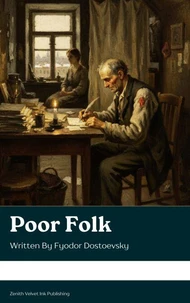A confession from the depths of alienation.
In Notes from Underground, Fyodor Dostoevsky gives voice to one of literature's most complex narrators-a retired civil servant living in self-imposed isolation in St. Petersburg. Bitter, intelligent, and deeply self-aware, this unnamed "underground man" delivers a scathing critique of rationalism, utopian ideals, and the illusions of progress.
Blending psychological insight with philosophical reflection, the novella is divided into two parts: the first, a monologue dissecting society and human nature; the second, a series of personal episodes that reveal the narrator's profound loneliness and inability to connect with others.
First published in 1864, this short but powerful work is widely regarded as a precursor to existentialist thought, influencing writers such as Nietzsche, Sartre, and Camus.
"One of the most important philosophical works of the 19th century."
- The Guardian
"Dostoevsky's most revolutionary creation-a man at war with himself and the world."
- The New York Times
? Why Readers Love It:
?? A cornerstone of existential literature
??? Masterful blend of fiction and philosophical inquiry
?? Short, intense, and deeply thought-provoking
?? Click 'Buy Now' to enter the mind of one of literature's most fascinating-and unsettling-narrators.
A confession from the depths of alienation.
In Notes from Underground, Fyodor Dostoevsky gives voice to one of literature's most complex narrators-a retired civil servant living in self-imposed isolation in St. Petersburg. Bitter, intelligent, and deeply self-aware, this unnamed "underground man" delivers a scathing critique of rationalism, utopian ideals, and the illusions of progress.
Blending psychological insight with philosophical reflection, the novella is divided into two parts: the first, a monologue dissecting society and human nature; the second, a series of personal episodes that reveal the narrator's profound loneliness and inability to connect with others.
First published in 1864, this short but powerful work is widely regarded as a precursor to existentialist thought, influencing writers such as Nietzsche, Sartre, and Camus.
"One of the most important philosophical works of the 19th century."
- The Guardian
"Dostoevsky's most revolutionary creation-a man at war with himself and the world."
- The New York Times
? Why Readers Love It:
?? A cornerstone of existential literature
??? Masterful blend of fiction and philosophical inquiry
?? Short, intense, and deeply thought-provoking
?? Click 'Buy Now' to enter the mind of one of literature's most fascinating-and unsettling-narrators.

 , qui est-ce ?
, qui est-ce ?